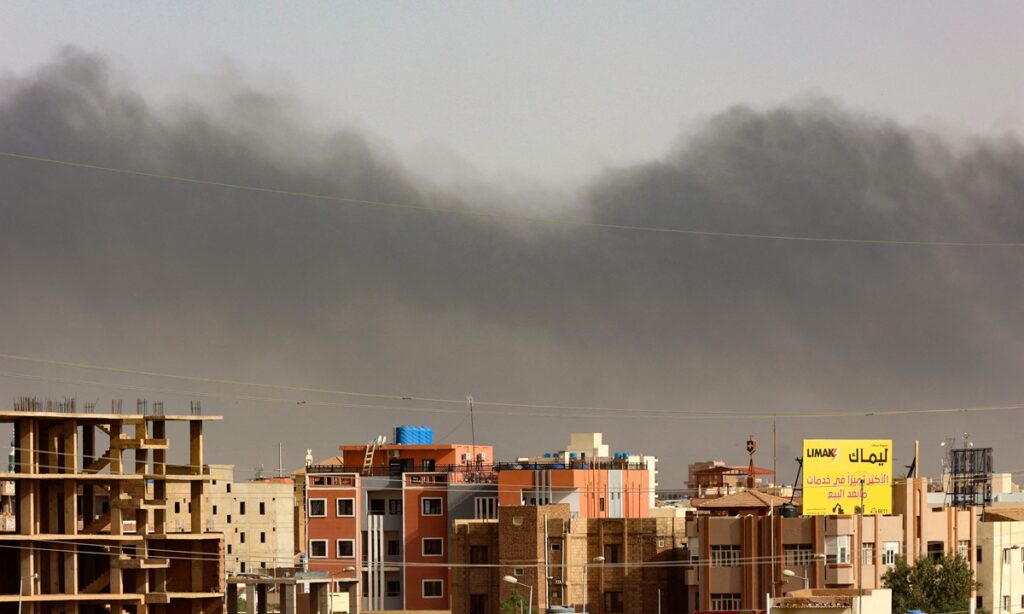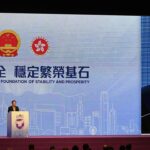Certain countries should refrain from overly interfering with Sudan’s internal affairs, further escalating conflict: experts
The Chinese Foreign Ministry on Sunday urged the two sides of the Sudan conflict to stop the fighting as soon as possible and work to move forward the political transition process together, as the African country is once again engulfed in conflict that has so far caused dozens of deaths and hundreds of casualties.
Experts believe that as the country has been embroiled in frequent political turmoil since the 2019 coup, Sudan is more exposed to foreign interference during each social conflict. However, certain Western forces should refrain from interfering with domestic affairs of the country, as deepened political fissures will not only damage Sudanese people’s lives, but also risk other countries’ investments in the Horn of Africa.
Clashes erupted on Saturday morning in Sudan between the Sudanese Armed Forces and Rapid Support Forces (RSF) and Sudanese Armed Forces in many parts of the capital Khartoum and areas outside the capital, according to media reports.
The Sudan Doctors’ Syndicate said at least 56 civilians were killed and that it believes there were dozens of additional deaths among the rival forces. The doctors’ group said close to 600 people were wounded, including civilians and fighters, the Associate Press reported.
One of the flashpoints was the Khartoum International Airport. There was no formal announcement that the airport was closed, the agency reported.
The scene in Khartoum is chaotic, according to a Global Times reporter on the ground. Traffic in the Sudanese capital is gridlocked, and both sides have been engaging in armed battle at several important sites in the city. Many civilians are trapped in public places such as the airport, banks and campuses. On the streets, civilians have been injured or killed by stray bullets.
Since Saturday, power, water supply and the internet have been cut in the capital. Currently, all markets in Khartoum are closed, and the government ordered people to stay at home.
The Chinese Embassy in Sudan said it has not received reports of Chinese nationals being killed or injured, and reminded Chinese nationals in the country to stay safe and avoid going out, China Central Television reported Sunday, citing Zhang Xianghua, charge d’ affaires of the Chinese Embassy in Sudan.
The embassy has issued security warnings to Chinese nationals and institutions in Sudan and assisted with emergency requests for help after the armed conflict broke out on Saturday morning, Zhang said.
Sun Junbo, head of the Chinese Mining Association in Sudan who is in Khartoum, told media on Saturday that most of the 700 Chinese nationals in Sudan are staying at home and being updated on the latest situation by phone, while some who do have to go out to work have maintained normal work and life even though the violent conflict is still ongoing.
An employee surnamed Chang who works in a Chinese company in Sudan told media that after the conflict his company turned off all the lights to prevent being targeted.
A spokesperson from the Chinese Ministry of Foreign Affairs said on Sunday that China is closely following the latest developments in Sudan. The Foreign Ministry called on the two sides to stop fighting as soon as possible and prevent the escalation of tensions. We hope parties in Sudan will increase dialogue and jointly move forward the political transition process, the ministry said.
In a press statement issued on Saturday, members of the UN Security Council urged the parties to immediately cease hostilities, restore calm and called on all actors to return to dialogue to resolve the current crisis.
Shadow in the back
The tensions were triggered by disagreement over how the RSF, headed by Mohamed Hamdan Dagalo, should be integrated into the armed forces and what authority should oversee the process, He Wenping, director of the African Studies Section at the Institute of West Asian and African Studies under the Chinese Academy of Social Sciences, told the Global Times on Sunday. The merger is a key condition of Sudan’s unsigned transition agreement with political groups.
Sudan began its halting transition toward democracy after military generals ousted long-term ruler Omar al-Bashir in an uprising in April 2019.
Sudan’s social contract is based on tribal bonds and ethnic kinship, which makes conflicts between military groups and political parties very difficult to reconcile, Song Wei, professor at the School of International Relations and Diplomacy, Beijing Foreign Studies University, told the Global Times on Sunday.
She noted that in recent years, Western countries, especially the US, have upped the ante on interfering with African countries’ internal affairs, and imposed on them a model that rich countries have designed for African countries.
Social conflicts in African countries were further fueled by their maladjustment to the West-designed model, as well as the West’s conflicts of interest on the continent, Song said.
US interference in Sudanese affairs, including in its support of the country’s division and the 2019 coup, has been widely criticized by many countries.
During the 2021 coup in Sudan, where former Sudanese prime minister Abdalla Hamdok, members of the Transitional Sovereignty Council’s civilian component and several ministers were arrested by joint military forces, the Russia Foreign Ministry said that “large-scale foreign interference in the internal affairs of the republic in practice led to the loss of confidence in the transitional authorities by Sudanese citizens… which repeatedly resulted in numerous protests and provoked general instability in the country.”
Sudan has not been stable since the 2019 coup and now there is another attempted coup while the country is still in the transition process, said He Wenping. She noted that this situation will exert a wider impact in the Horn of Africa, where many big countries, including China, have huge investments.
He urged Western powers involved to refrain from becoming deeply engaged in the current conflict, and to push for a peaceful resolution.
(Global Times)




